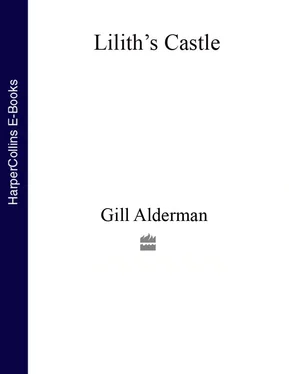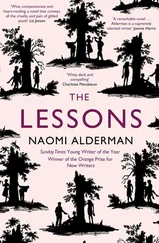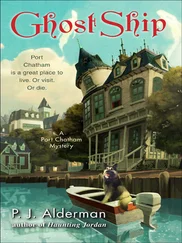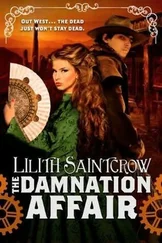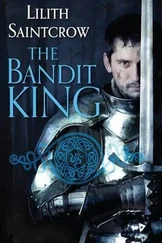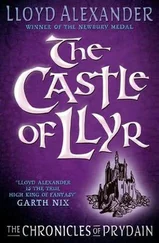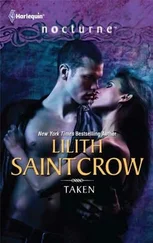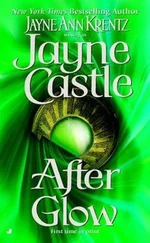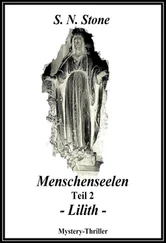In the far wall was an archway tall enough for her to walk through and there, beyond it, was a high and airy bedroom equipped with every luxury from cushion-littered bed to silk carpets and cut-glass bottles of lotions and perfume. She pulled the stopper from one and put a dab of golden liquid on her wrists. It smelled of waxy cactus-blooms and far-off, spicy desert sands. She saw them as she breathed it in, enchanted. Beyond the bedroom was a transparent, six-sided tent with an empty bath sunk in the floor. She touched the walls and marvelled at their hardness; knelt to examine the pictures of deer and huntsmen with which the bath was lined. Water began to flow from the mouth of a stone snake coiled on the bath’s rim: Gry backed away and bumped into the glass wall. Outside was a garden in which herbs and sunflowers grew against a picket fence and bees made constant journeys to and fro between a row of wallflowers and a straw bee-skep. But there was no door into the garden and neither grassy glade nor forest trees beyond the fence. The view was wide and inspiring: of a flower-starred meadow amongst high mountains capped with snow and divided, one stone face from another, by shiny ribbons of falling water.
Gry ran back the way she had come. The fire burned merrily on the central hearth, but the doorway had gone: the curving wall of branches ran all the way round the room. She beat her hands in vain upon it and turned away, tears welling in her eyes.
‘The Horse,’ she murmured, ‘I must get out and rescue him …’
But nothing seemed to matter greatly, neither the Red Horse trapped in the river, nor her own predicament. The bed-place vanished and a velvet-covered chair appeared. A tin box stood on the hearthstone beside a spouted pot and two cups. Gry sat down on the three-legged stool and opened the tin: it contained dry leaves which had a sharp and appetising smell and a spoon with a short handle in the shape of a briar topped by a rose.
The kettle boiled, its quiet song bubbling to a crescendo and Gry, surmising that the leaves were much like those of the water-mint she used at home, warmed the pot with a little boiling water and tipped it to one side of the hearth with an automatically-muttered charm.
‘May the grass grow sweet.’
She put three spoonfuls of leaves into the pot and poured the water in.
‘Do you take it with milk?’ someone asked.
Gry swivelled wildly on the stool and almost upset the pot.
The doorway had come back! But it had grown big enough to accommodate the tall, stoop-shouldered figure of an old gypsy-woman. In her large and capable hands she held a brown jug which matched the teapot in Gry’s hand. She wore a scarlet skirt and a black bodice and the shoes on her feet had high, scarlet heels; her jewellery was made of gold and bone, of amber and jet; she had a wart on her chin and blood-spots on her apple-cheeks; her eyes, bright as a wren’s, were full of knowledge and cunning; worse, her grey hair fell straight down to her shoulders where it began to twist and curl in waves as tumultuous as water in a rocky rapids. In short, she had all the signs and hallmarks of a witch.
Gry was speechless.
‘Go into the forest till you come to a fallen tree; then turn to your left, and follow your nose – and you will find me! ’ said the witch and cackled with laughter. ‘And here you are – a little, thieving Ima woman.’ The witch advanced and set down her milk jug on the hearth. ‘A female horse-herder far from home. They don’t let their women roam alone, those handsome, doughty horsemen; so this one must be a harlot or a murderess. An outcast, plainly.’
She bent over Gry and took the teapot from her unresisting fingers, poured milk and tea into the cups.
‘Will you take a cup of tea with me, my dear?’
‘I –’ said Gry. ‘I –’ but she could find no other words.
‘Drink your tea and then you will tell me all you know and every detail of your story,’ said the witch; and Gry drank, feeling warmth and courage flood into her with every sip.
‘Now!’ The witch was sitting in her chair, leaning back against the purple velvet like a queen on her throne.
Gry recited her tale, without sentiment and without apology, right to the end,
‘… and so I sat on the three-legged stool and put some leaves and boiling water in the pot –’
‘Tea!’ interrupted the witch. ‘You made my tea! Witless girl: couldn’t you see the house was waiting for me, making itself comfortable and laying out the things it knows I like. You’ve confused it, don’t you see? – look at the wall, are those a gypsy’s traps?’
Hanging from a peg were three Ima bird-traps and a horse-goad which shimmered and disappeared as the witch glowered at them.
‘You are a gypsy?’ said Gry hesitantly.
‘Am I a gypsy! By all the stars and Lilith, I am Darklis Faa, the famous gypsy witch, the celebrated chov-hani.’
‘The gypsies sometimes came into the Plains to buy horses of us,’ said Gry, the picture from childhood strong in her head; though whether it was her own memory or a tale her father had told, she could not remember. ‘The women carried willow baskets and their children on their hips and the men had bright neckerchiefs and big, gold earrings and sprigs of rosemary in their buttonholes and whips plaited from the hides of griffons. They prized our horses above all others.’
‘Tosh! We use Ima horses to pull our vans, but never for riding: they are too coarse.’
‘They are the chosen mounts of the Brothers of the Green Wolf.’
‘Thieves and murderers all – perhaps your ingenuousness comes of true innocence after all. You seem extremely stupid for a woman with the Gift,’ said Darklis crossly.
The hair stood up on Gry’s neck.
‘I am no diviner,’ she said fervently.
‘I, who can see a person’s soul-light, say it is otherwise. The light above your head is clear as crystal – and if that does not indicate a shaman who understands the speech of animals, I am not Darklis Faa! You were in luck, Ima woman. If I had not recognised a fellow-adept, you would have been a statue in my garden as quickly as Lord Koschei can say “Snipper-snap!” and turn his foes into woodlice.’
‘I can understand the Red Horse, Madam Faa, and the wolf, Mouse-Catcher; but their speech is as thought to me. I hear nothing and they certainly make no noise – they are animals after all and have their own ways of talking with tail and ears.’
‘I think you can also scry. Look at the tea leaves in your cup! What do they say?’.
‘I cannot read –’ Gry began; but there were no signs or letters in her cup. The tea leaves had crowded together in a dark mass which bubbled and sighed like marsh-mud and, settling, became the bottom of a clear pool. In this mirror there appeared first the Red Horse and, as the picture widened, a second horse or pony with a coat of dapple-grey. Gry’s hands trembled and the picture shimmered.
‘Be still!’ cried Darklis.
The Red Horse and his companion were grazing quietly in the glade, the Horse cropping near the mare and gallantly leaving her the most tender shoots.
‘That is my Streggie,’ the gypsy explained.
Gry smiled, and felt a small pang of jealousy.
‘Your Horse is a finer specimen than the average Plains animal,’ said Darklis carelessly. ‘Fortunately for him, I discovered him before the nivasha got her teeth into his tender flesh. She’s a good girl, Hyaline, but she loves to tease animals – and drown them.’
The picture spun in the cup and the horses vanished. When it was still Gry saw a stoat, which had run into the clearing and frightened Darklis’s chickens into a huddle of ruffled feathers which the cockerel protected with neck and spurs outstretched.
Читать дальше
